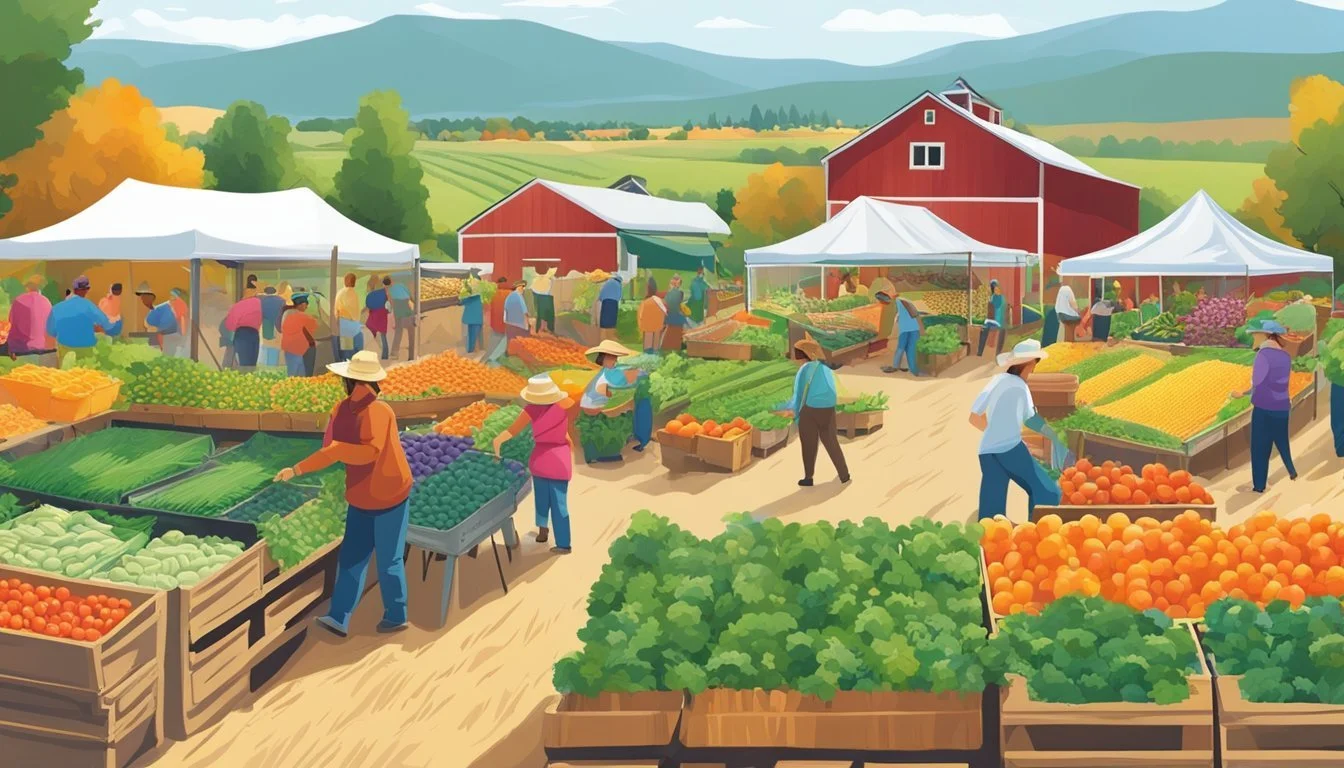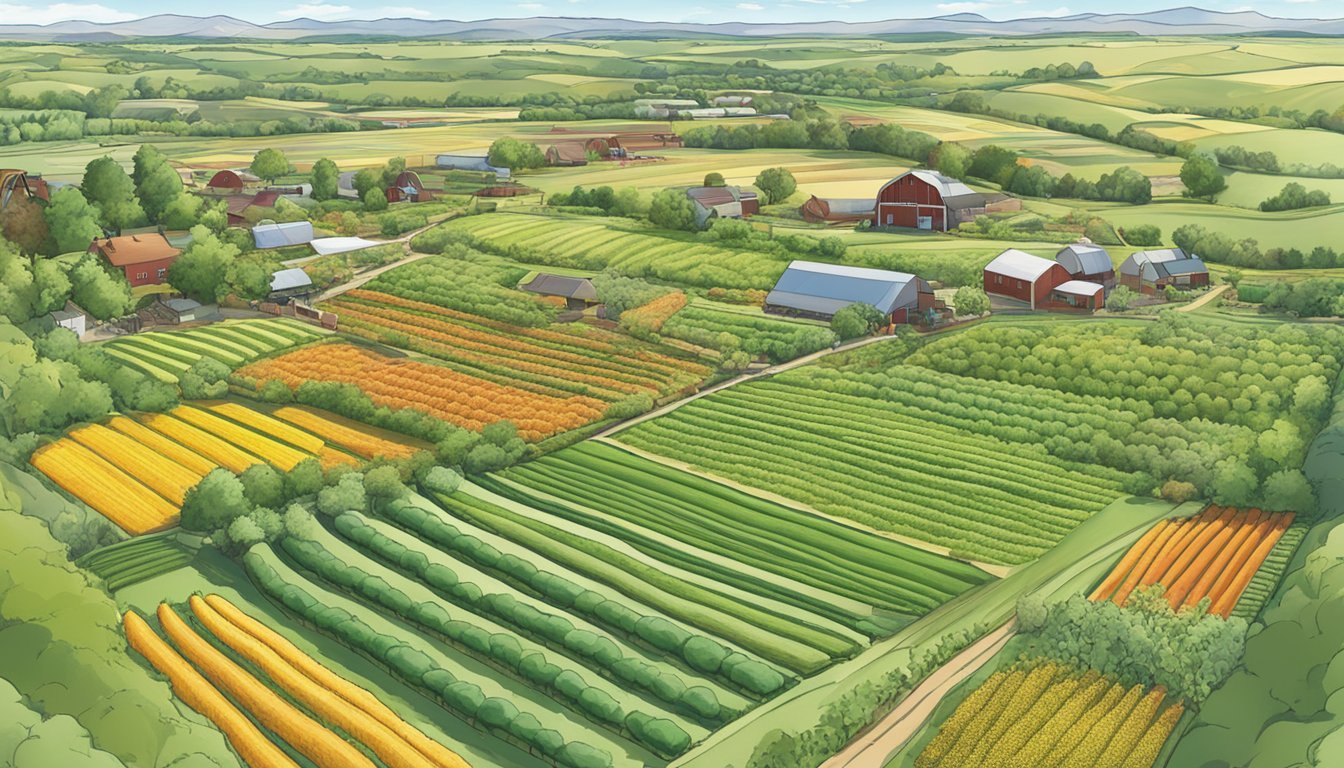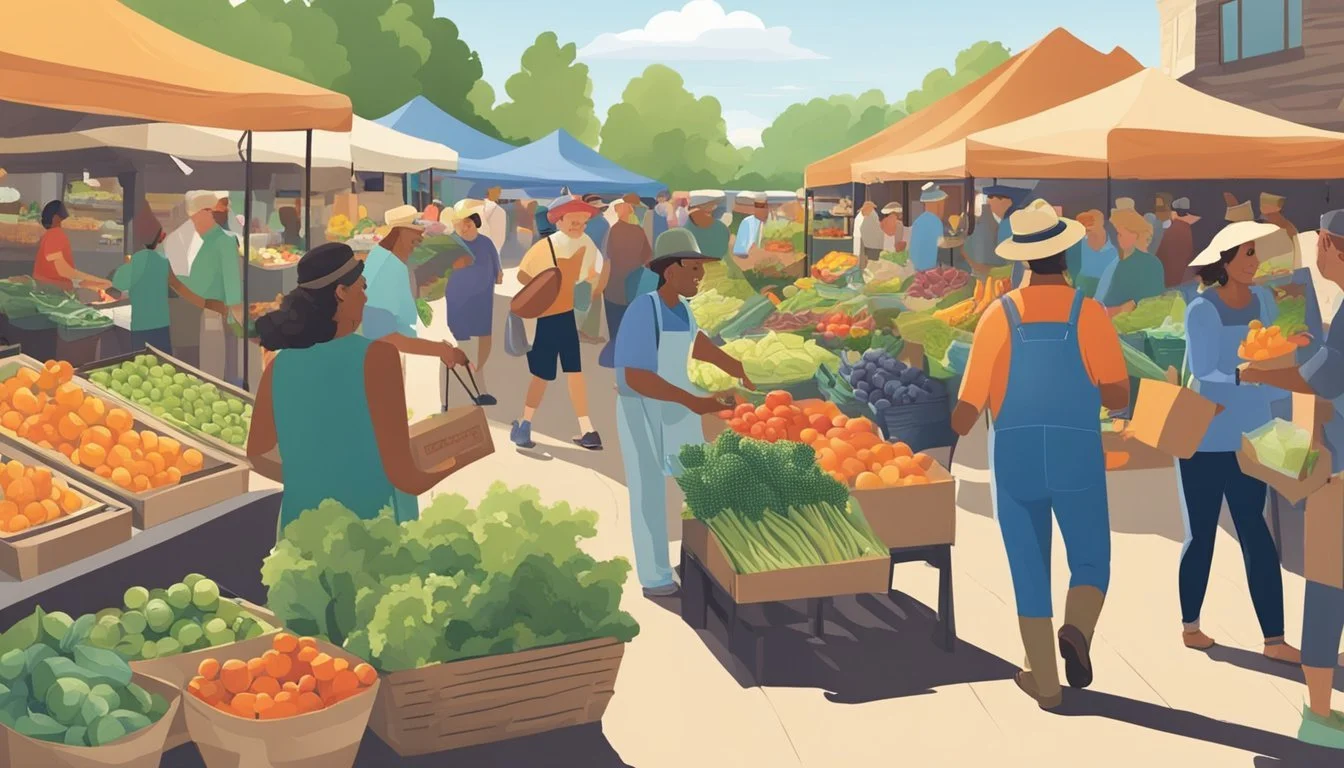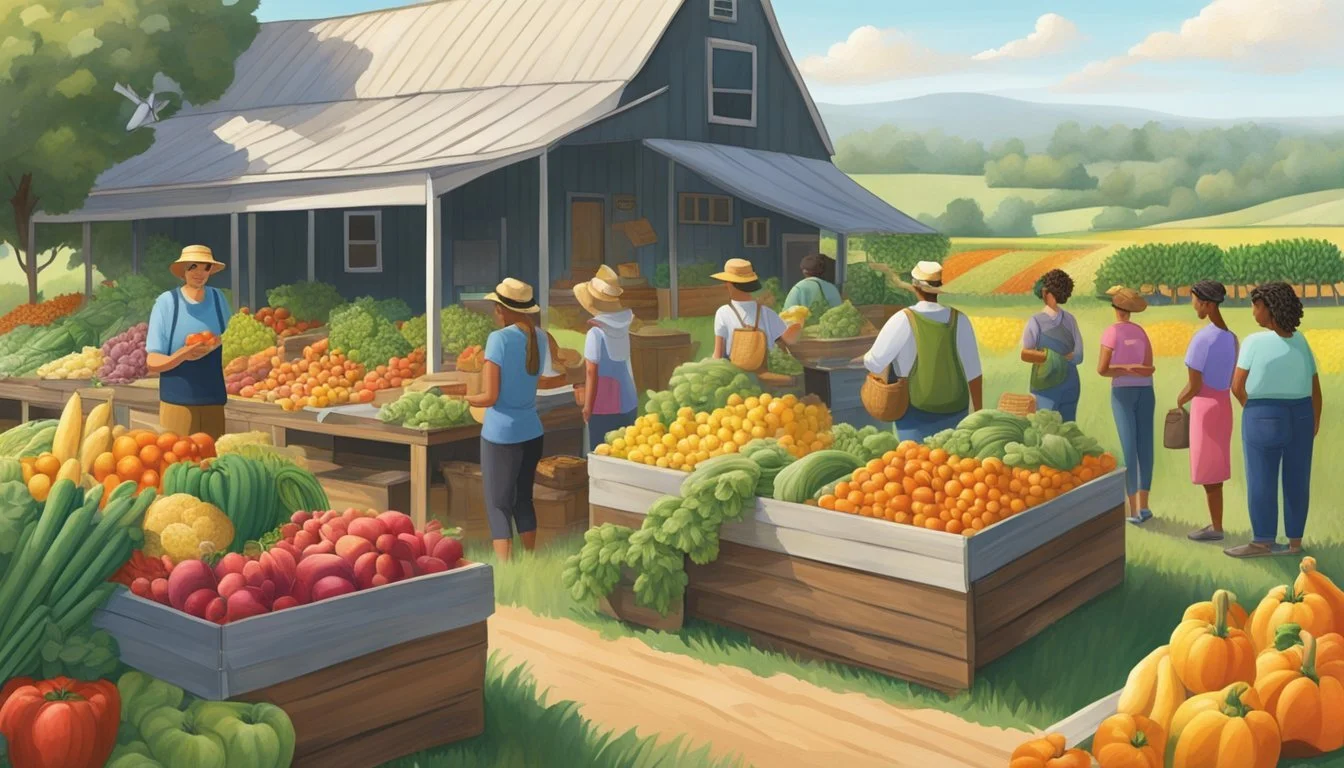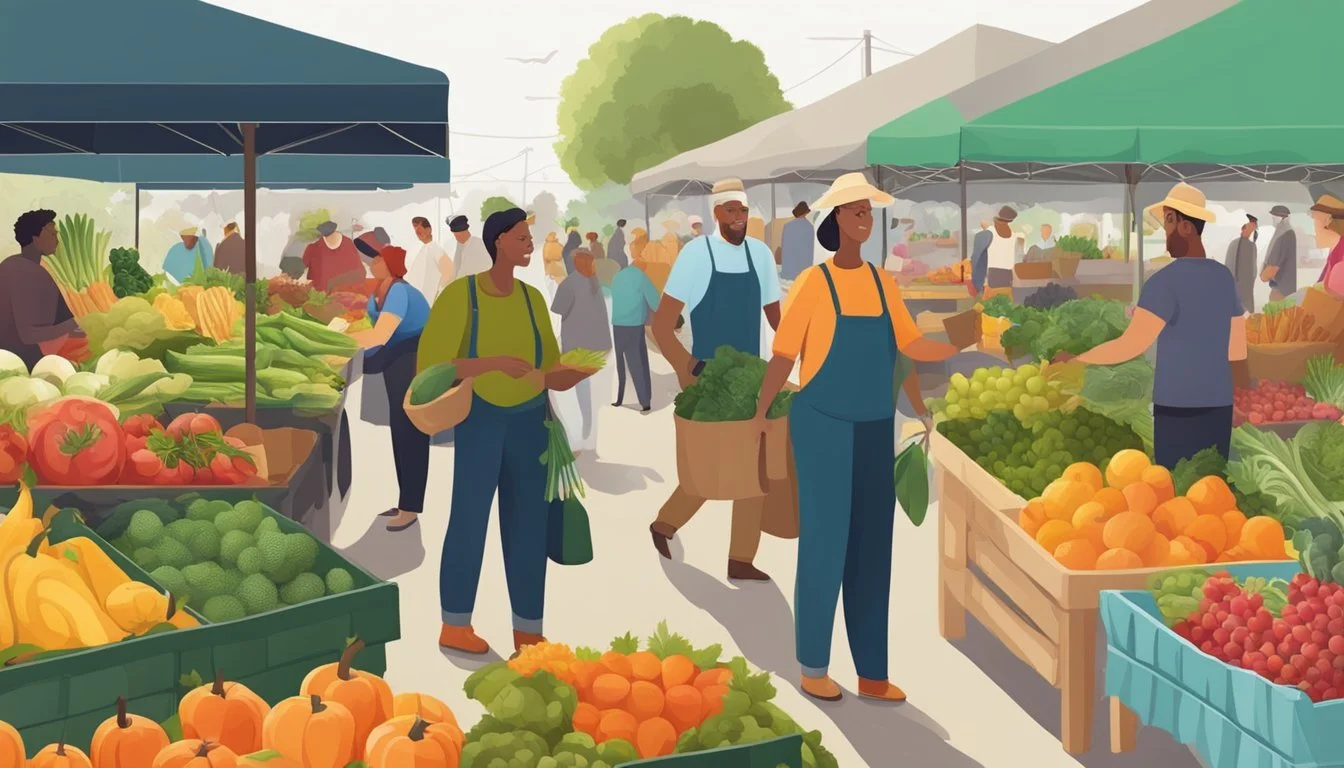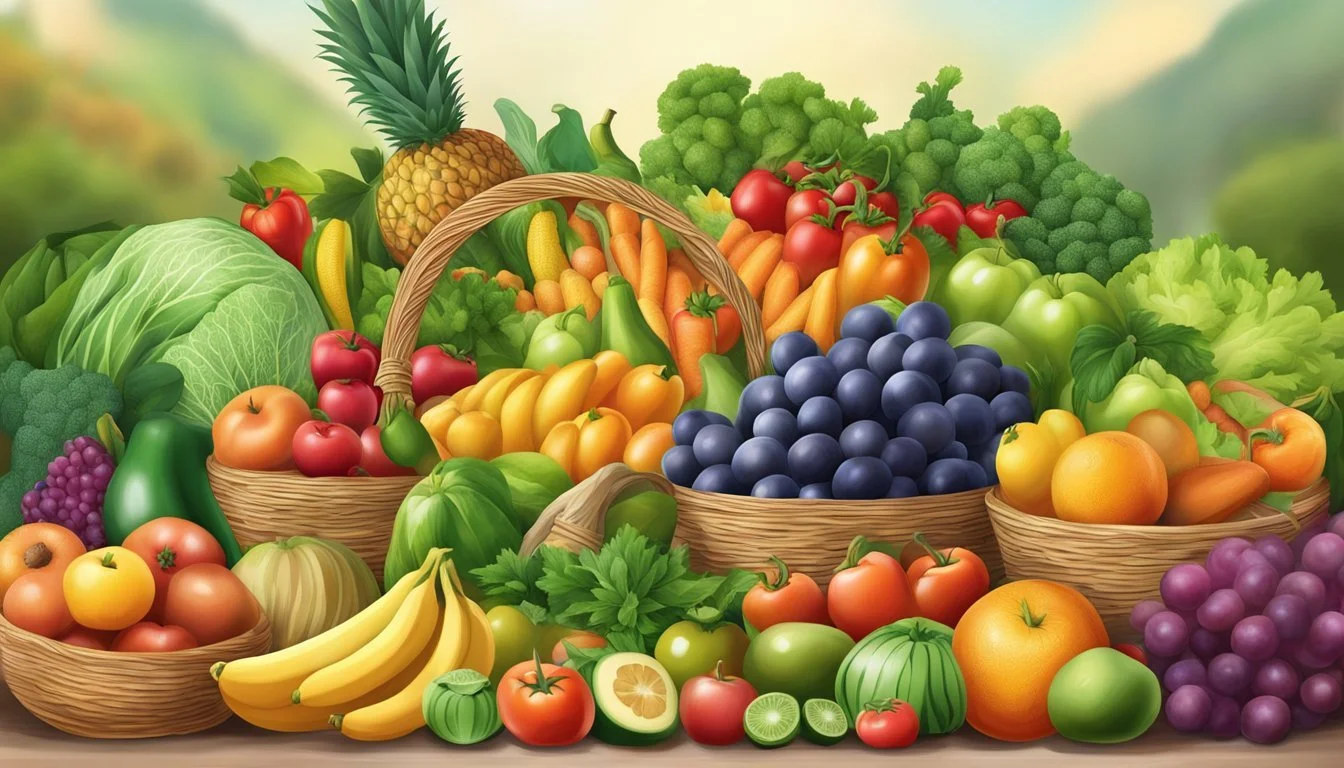Community Supported Agriculture (CSA) in Aurora, CO
Fresh Produce, Local Impact
Community Supported Agriculture, or CSA, has become a vital part of Aurora's local food movement, connecting residents with the freshest seasonal produce directly from area farms. Through CSA programs, consumers in Aurora purchase a share of a farm’s harvest in advance, which not only provides them with regular distributions of fresh produce but also fosters a stronger connection between the farmer and the consumer. This symbiotic relationship helps to create a more sustainable local economy, supports farming operations upfront, and enables consumers to become active participants in the cultivation and distribution of their food.
The city of Aurora boasts a variety of CSA options, reflecting Colorado's rich agricultural heritage. These programs allow members to receive a weekly or bi-weekly box of fruits, vegetables, and sometimes additional farm products like eggs or honey. The offerings from each CSA vary and are dependent on seasonal availability; many farms employ organic practices and prioritize ecological sustainability, although certification may vary. By joining a CSA in Aurora, members gain the opportunity to enjoy fresh, locally grown produce while supporting local farms and contributing to food security within their community.
Aurora's CSAs emphasize community involvement and education, often providing opportunities for members to visit the farms and participate in farm events. They serve as a proactive answer to a growing consumer demand for transparency in food production and sourcing, offering an alternative to conventional food supply chains. Such direct farm-to-table approaches are instrumental in driving the conversation about responsible agriculture and the future of food in urban communities.
Understanding CSA
Community Supported Agriculture represents a unique model of food production and distribution. It forges a partnership based on a subscription-like investment from community members into local farming operations.
Concept of Community Supported Agriculture
The core idea of Community Supported Agriculture (CSA) revolves around a relationship between local farmers and community members. Individuals become members of a CSA through a subscription or membership fee that contributes to the farm's production costs. In return, members receive a weekly or bi-weekly share of the produce during the farming season. This share typically includes a variety of vegetables and, in some cases, fruits, herbs, meat, and dairy products.
Subscription: Annual or seasonal payment by community members
Share: Distribution of farm produce to members
Member: An individual or family invested in the CSA
Relationship: The mutual commitment between the community and farmers
Benefits of Joining a CSA
Joining a CSA offers several advantages for both members and farmers alike.
Access to Fresh Produce: Members relish in fresh, seasonally available farm products.
Support Local Agriculture: Membership fees directly support farming operations.
Learn About Produce: Individuals gain insight into food seasonality and sustainable agriculture.
Foster Community Ties: CSA cultivates a sense of community through shared commitment and regular distribution events.
Members receive not only food but also an educational experience about where and how their food is produced.
Farmers benefit from a dependable income source, which can improve their financial stability and allow focus on quality farming practices without the pressures of conventional market demands.
CSA Farms in Aurora, CO
Community Supported Agriculture (CSA) in Aurora, Colorado, is a thriving aspect of the local food movement, where the bond between local farms and community members is mutually beneficial and supportive.
Role of Local Farms
Local farms play a critical role in sustaining the CSA model by providing a steady supply of fresh, seasonally available produce to their members. They connect the community with the agricultural process and often employ sustainable farming practices. In Aurora, CO, these local farms keep the community engaged with agriculture through educational programs and events, fostering an understanding of where food comes from.
Selecting a CSA in Aurora
When choosing a CSA in Aurora, it is essential for potential members to consider the variety of produce offered, the location of pick-up points, and the farm's commitment to sustainable practices. Members should also be aware of the share sizes available to match their household needs and whether the farm offers the opportunity to visit and participate in farm activities.
Profiles of Prominent Aurora CSAs
Delaney Community Farm:
Location: Aurora, CO
Features: Focuses on organic practices, offers educational opportunities, and serves as a model for urban farming.
Cultiva:
Attributes: Known for growing produce sustainably and building community through agriculture with a hands-on approach.
These CSAs exemplify the spirit of community and sustainable agriculture in Aurora, providing residents with fresh, locally-grown food and a tangible connection to the land. Each farm has its unique approach to farming and community engagement, contributing to a diverse agricultural landscape in the region.
Organic and Regenerative Practices
Community Supported Agriculture (CSA) programs in Aurora, CO, emphasize the importance of sustainable farming techniques, including the adoption of certified organic methods and regenerative farming practices. These approaches prioritize soil health, biodiversity, and ecological balance.
Understanding Certified Organic
Certified organic farming in the context of CSAs refers to the production of pesticide-free and chemical-free produce. For a farm to be labeled "certified organic," it must adhere to strict guidelines that prohibit the use of synthetic pesticides and fertilizers. The certification process ensures that organic egg producers and vegetable farmers maintain these standards, providing consumers with confidence in the origins and methods of production of their food.
Requirements for Certified Organic:
No synthetic pesticides or fertilizers
Commitment to maintaining soil health
Preservation of biodiversity
Routine inspections by certification agencies
Regenerative Farming Methods
Regenerative farming goes beyond organic practices by actively enhancing and revitalizing the ecosystem. At its core, it involves methods that increase carbon sequestration, which captures atmospheric carbon dioxide and stores it in the soil. CSAs that implement regenerative techniques work not only to produce ecologically-organic food sustainably but also to repair and build upon the natural resources they use.
Key Regenerative Practices:
Crop rotation and diversity to enhance soil health
The use of cover crops to prevent soil erosion
Integrated pest management to decrease the need for chemicals
No-till or reduced-till farming to preserve soil structure
Regenerative farms focus strongly on the long-term vitality of the land, ensuring that it remains fertile and productive for future generations. By engaging in these practices, Aurora's CSA programs contribute to a healthier planet while providing fresh, local, and sustainably produced food to their communities.
Membership Details
Community Supported Agriculture (CSA) is a way for consumers in Aurora, CO, to invest in local farms and receive a portion of the harvest. Membership typically involves purchasing a share at the beginning of the growing season, which then provides members with regular distributions of the farm's produce.
Types of Shares and Subscriptions
Weekly and Bi-weekly Shares: Members can typically choose between weekly or bi-weekly distributions. Weekly shares are suitable for those who consume more vegetables or have larger households, while bi-weekly options may cater to individuals or smaller families.
Size Variations:
Small Share: Ideal for 1-2 people, provides a small quantity of vegetables.
Standard Share: Designed to feed an average-sized family, it includes a broader variety of produce.
Subscription Length:
Full Season: Covers the entire growing period, often from late spring to early fall.
Half Season: For those who cannot commit to a full season or want to try the CSA experience for a shorter time frame.
Payment Options:
Full Payment: Members pay the entire cost upfront, which helps support the farm's operational expenses at the start of the season.
Payment Plans: Some CSAs offer installment plans to alleviate the upfront financial burden.
Local Food Commitment: Becoming a CSA member supports local agriculture and promotes consumption of fresh, locally-grown food. It connects the community with the rhythms of the farming season and provides invaluable support to local growers.
Distribution and Accessibility
Community Supported Agriculture in Aurora, CO, boasts diverse delivery options and prioritizes making fresh produce accessible to the community. Residents have the flexibility to choose the most convenient way to receive their farm shares, enhancing the CSA experience.
Delivery Options and Pickup Locations
CSAs in the Aurora area offer various delivery options and pickup locations to members, ensuring convenience and flexibility.
Home Delivery: Some farms provide the luxury of home delivery, bringing the season's best right to the doorstep.
Community Pickup Points: Numerous centralized locations, including neighborhood markets and community centers across Aurora, serve as convenient pickup points for CSA members.
Farm Pickup: Members can often opt to collect their shares directly from the farms, fostering a closer connection to where their food is grown.
Areas around Aurora, such as Denver, Boulder, and Wheat Ridge, are included in this network, increasing the reach of local CSAs.
Addressing Food Accessibility
CSAs around Aurora take significant strides to address food accessibility, understanding the importance of reaching all community members.
Subsidized Shares: Some farms offer discounted or subsidized shares for low-income families, ensuring economic barriers do not prevent access to fresh, healthy food.
SNAP/EBT Acceptance: Accepting food assistance programs like SNAP/EBT at many pickup locations, CSAs support individuals and families in affording CSA memberships.
Education and Outreach: Efforts such as workshops and farm visits are aimed at educating community members about the benefits of CSAs and sustainable agriculture, cultivating a culture of health and environmental awareness.
By setting up accessible models, the CSAs near Aurora are not only nurturing bodies but also building stronger community relationships.
Local Agriculture Ecosystem
The agriculture landscape in Aurora, CO is a dynamic system that fosters connectivity between the community and local producers through Community Supported Agriculture (CSA) and farmers markets.
Community Impact and Education
Local CSAs, such as the Denver Urban Gardens and cooperative CSAs, play a crucial role in educating the Aurora community on sustainable agriculture practices. They provide hands-on learning opportunities and have a substantial impact on fostering a sense of community. Participants not only receive fresh produce but also engage with the very process of farming, understanding the seasonality and the challenges involved in food production.
Denver Botanic Gardens Chatfield CSA, a non-profit establishment, is one such entity that contributes to this educational eco-system. Since its inception, it has seen an expansion from 1 acre and 55 shares to 7 acres with 325 shares, demonstrating a growing community interested in local farming practices.
Synergy with Farmers Markets and Local Producers
Aurora's local producers find harmonious connections with area farmers markets. This synergy allows for a broader distribution of goods, benefiting both farmers and the consumers who crave local, organically grown produce.
Table 1: Connection between Local CSA and Farmers Markets
CSA Program Related Farmers Market Notes Denver Botanic Gardens Chatfield CSA LocalHarvest Farmers Market Both emphasize organic practices and community engagement.
Farmers benefit from direct outlets for their products at these markets, while consumers enjoy access to fresh, in-season produce. This collaboration encourages local economic growth, sustainability, and reinforces community ties.
Seasonality and Adaptability
In Aurora, Colorado, the success of Community Supported Agriculture (CSA) hinges on navigating the variability of weather patterns and the length of the growing season, which directly impact the range and quality of farm products available.
Effects of Weather on CSA Operations
Weather plays a crucial role in the planning and operations of CSAs in Aurora, as it influences both what can be grown and when it can be harvested. The growing season generally spans from late spring to early fall, with CSA shares typically distributed during this time. Farmers must carefully select crops that are well-suited to the local climate, which can include a wide temperature range and varying precipitation levels.
Temperature: The region experiences a range of temperatures throughout the year, which can affect the germination rates and growth patterns of crops. Farmers must adapt by choosing crop varieties that can withstand cooler springs and hotter summers.
Precipitation: Varying levels of rainfall and snow can either bolster crop growth or pose challenges such as drought or flooding. To adapt, CSAs may implement irrigation systems and employ water conservation techniques.
Frost: Sudden frosts can threaten tender plants, prompting farmers to use protective measures such as row covers or to select frost-tolerant varieties.
The adaptability of CSA farmers in managing these weather-related challenges ensures a consistent supply of farm products to community members. Efficient planning and the cultivation of resilient crop varieties allow CSAs to provide fresh, locally-sourced produce throughout the designated growing season, solidifying the bond between the community and local agriculture.
Local CSA Case Studies
Community Supported Agriculture (CSA) programs in Aurora, CO, demonstrate a commitment to sustainable farming and community engagement. This section explores two distinct models: the time-honored practices of Monroe Organic Farms and the innovative approaches adopted by urban farms.
Monroe Organic Farms: A Pioneer in CSA
Monroe Organic Farms, located near Kersey, is renowned as the oldest organic farm in Colorado. They have been at the forefront of the CSA movement since its inception, providing a wealth of organic produce to members throughout the state, including those in Colorado Springs. The farm operates on a simple yet impactful model:
Location: Kersey, CO
Contribution to CSA: Pioneered CSA practices in Colorado
Membership: Options ranging from individual to large shares
Products: Diverse selection of organic vegetables, fruits, and meats
Innovative Approaches by Urban Farms
Urban farms in Aurora, embracing contemporary urban agriculture practices, have been ingenious in their approach to CSA. One such example is the Denver Green School Community Farm. As an urban agriculture nonprofit, they collaborate with entities like Project Worthmore to bring fresh, organic produce to urban communities. Their CSA model includes:
Location: Aurora, CO
Partnerships: Engaging with schools and nonprofits like Project Worthmore
CSA Focus: Education and accessibility of organic produce in urban settings
Program Details: Weekly CSA shares coupled with agricultural education programs
By adapting traditional farming to an urban context, these farms offer a blueprint for integrating sustainable agriculture into a metropolitan lifestyle.
Economic Aspects
Community Supported Agriculture (CSA) in Aurora, Colorado presents various economic considerations, including the assessment of cost and member value.
Assessing the Cost and Value of CSA Memberships
When assessing the cost of CSA memberships, it's important to note that members typically pay an upfront annual fee. This fee contributes to the farm's operational costs for the upcoming season. In return, members receive fresh, locally grown produce periodically throughout the farming season. The price of these memberships varies but is intended to reflect the cost of production and be affordable to the community members.
Value is derived not just from the produce provided but also from the direct support of local agriculture, which can bolster the local economy. Members often find additional value in the form of educational experiences and a closer connection to their food source.
Membership Type Price Range Features Individual $X - $Y Suitable for singles or couples Small Family $X - $Y Intended for small families, includes more variety Large Family $X - $Y Designed to meet the needs of larger families, provides the greatest variety
Note that prices are illustrative and specific costs can vary based on farm operation, size of share, and the range of produce included. CSA in Aurora aims to offer affordable prices while ensuring financial sustainability for the farmers. Members must consider both the upfront cost and the seasonal value they receive, which includes high-quality, fresh produce over a set period.
Diversity in CSA Offerings
Community Supported Agriculture (CSA) in Aurora, CO offers a rich array of produce and farm products. From the wide variety of crops to the inclusion of ethical animal products, CSA shares in this region are uniquely diverse.
Crop Varieties and Unique Farm Products
In Aurora, CSA members can expect an impressive selection from heirloom vegetables to unique flowers. Everitt Farms specializes in a range of heirloom varieties, cultivating a taste of history with each product. Sandy's Way Microfarm and Blossom & Branch, focusing on small-scale production, provide members with an assortment of native plants and vegetables. TwoInTents offers an ecologically sound approach, exemplified in their array of vegetables and herb CSA shares. For those seeking organic fruit options, the Colorado Western Slope Organic Fruit Share includes fruits acclimated to high-altitude conditions, courtesy of High Altitude Organics, Inc.
Farmers like Crescendum Flower Farm contribute a different kind of diversity with their array of unique flowers, adding aesthetic and ecological variety to the CSA shares. These offerings not only bring variety to the kitchen table but also contribute to the conservation of biodiversity in the Rocky Mountain region.
Animal Husbandry in CSAs
Bluetrane Heritage Farm and Ebert Farms are known for their commitment to raising animals responsibly. They provide CSA members with grass-fed beef, exemplifying the eco-conscious practices prevalent in the area.
Moondog Community Farm takes a spiritually-based approach, offering ethical kosher meat, while Lora's Nourishing Produce integrates chickens and jersey milk cows into their operation, demonstrating the role of animal husbandry in enhancing CSA diversity. The inclusion of livestock like cows and pigs in CSA operations creates a well-rounded agricultural experience, ensuring that members receive a wide range of products from family-owned enterprises that prioritize animal welfare and sustainable practices.


